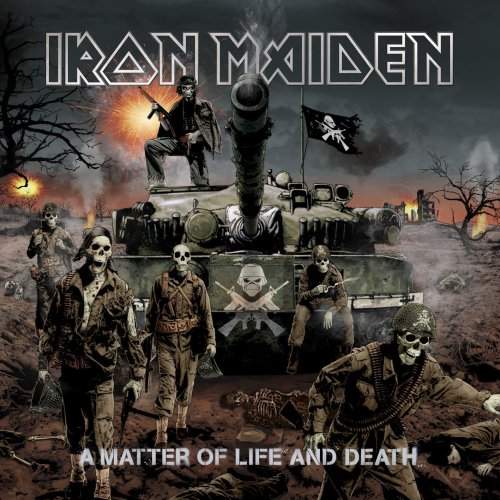My Favorite Iron Maiden Album! - 100%
Upon initially listening to A Matter of Life and Death, I thought I had recognized something no one else had noticed: namely, that this was perhaps one of the finest Christian metal albums I had ever heard. Well, upon further research and some gentle corrections from others, I have been forced to revise that opinion a bit. I still think there are some remarkable thematic elements that have fascinating parallels with Christian theology, and in that way, this is perhaps a more Christian album than many albums that purport to be contemporary Christian music. That being said, I don't think Iron Maiden set out to make a Christian record. I think they approached themes of life and death, peace and war, sin and salvation, with their customary integrity and honesty, and tapped into some universal themes.
Allow me to illuminate my point a bit. The song that initially caught my attention and got me examining the lyrics was "For the Greater Good of God." The last section piqued my curiosity: "He gave his life for us, He fell upon the cross/ To die for all of those who never mourn His loss/ It wasn't meant for us to fell the pain again/ Tell me why... Tell me why..." My initial thought was, this could be on a Petra album. Except, in a sense, this song is more honest and introspective than most of Petra's lyrics have ever been. This lyric is obviously referencing the death of Jesus, but it is asking a very valid question: Why? why do it, when no one seems to care?
There are some other excellent examples of theological introspection on the album, not to mention some thought provoking meditations on the horrors and stupidities of war. In the song "Brighter Than a Thousand Suns," the last line is "Holy Father, we have sinned..." In the Making of A Matter of Life and Death documentary, Bruce Dickinson talks about this song being about the Manhattan Project, perhaps one of the most horrifying attempts of humankind to "play God."
Then there's "Lord of Light" which I initially thought was about Jesus. Well, it turns out I was wrong--it's specifically about Satan, or Lucifer (which literally means "light bringer" in Latin). Bruce Dickinson has described the song as taking the position that maybe the "guy downstairs" got a bit of a bad rap. Still, I think it is significant from a religious perspective to examine the "relationship" between God and Satan. After all, in the Bible, the Book of Job describes God talking to Satan as if they were old pals. I know some of my Christian brethren and sistren would find the idea that God and Satan could have some meaningful dialogue an idea that borders on blasphemous, but I don't think they have done their homework. Besides, this song has a fascinating musical development. It starts very quietly, almost broodingly, the guitars just percolating along, then there's a pause right before things erupt in a fury. I think it's a great dramatic description of an argument between the "! guy downstairs" and his old boss. Which leads me to what really separates this album from some of the dreck in Christian "metal": the music.
I've seen some complaints about some of Iron Maiden's recent albums, how they don't rock as hard any more, etc. When it comes to this album, I completely disagree; A Matter of Life and Death rocks as hard as anything they've ever done. A perfect example is the aforementioned "For the Greater Good of God," which has vocals that rise in intensity, matched only by the equally stunning guitar riffs. The intensity builds until the very end, when the passage I quoted above interrupts, as if the experience has emotionally drained him until all he can get out is that question of "Why?" In general on this album, Bruce spends a lot of time in his high range, which matches the emotionaly intensity of the lyrics quite well. Also, several of the songs begin with a quietly seething energy, which serves as an introduction to the power that follows ("Brighter Than a Thousand Suns," for example). Perhaps those who complain about the heaviness of the sound (or lack thereof) don't appreciate the sublteties of beginning a piece with a controlled fury that later erupts. I believe the conviction with which Bruce sings, combined with the solid rhythmic drive of the rest of the band, form a perfectly matched combination of lyrical intensity, emotional power, and constant forward motion. Neither the lyrics nor the music seem to me to outshine each other; each serves the other.
Nicko McBrain has been very straightforward about his conversion to Christianity, as well as his decision to remain in the band, and I can't help but think that may have had an impact on the direction that this album took. But I don't want to give short shrift to the other guys, and their spiritual insights. This album may or may not be a "Christian album" in the strictest sense. But I wll tell you from a Christian standpoint that it is more insightful, harder rocking, and better produced than just about any album that purports to be Christian rock. The music is of an exceptionally high quality, and the lyrical content is powerful, honest, and to my way of thinking, highly thought provoking.

